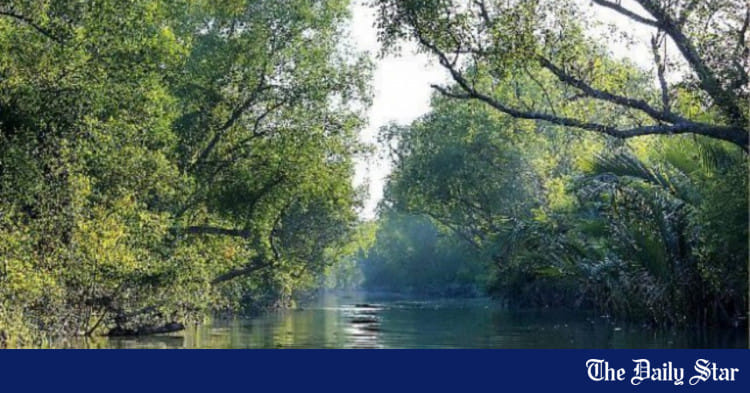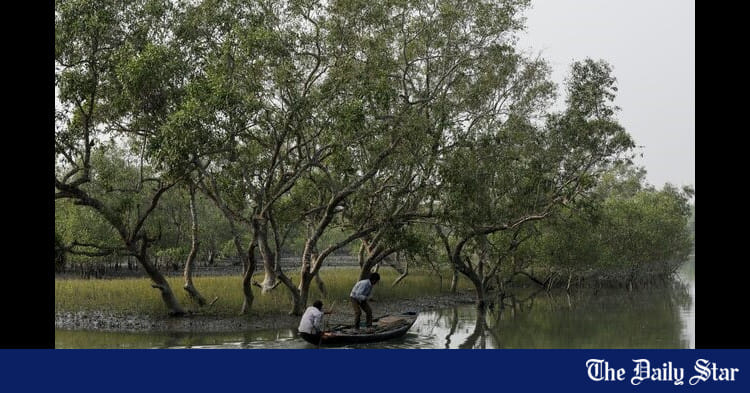Saif
Senior Member
- Joined
- Jan 24, 2024
- Messages
- 17,175
- Likes
- 8,204
- Nation

- Residence

- Axis Group


Sundarbans reopens Sunday after three-month closure
The Sundarbans are set to reopen for foresters and tourists from Sunday after a three-month closure. Following a long break, forester families living near the Sundarbans in Khulna are getting ready to resume fishing and crab hunting. Mihir Kumar Doe, conservator of forests for the Khulna region,
Sundarbans reopens Sunday after three-month closure
Published :
Aug 29, 2024 23:12
Updated :
Aug 29, 2024 23:12

The Sundarbans are set to reopen for foresters and tourists from Sunday after a three-month closure.
Following a long break, forester families living near the Sundarbans in Khulna are getting ready to resume fishing and crab hunting.
Mihir Kumar Doe, conservator of forests for the Khulna region, said as many as 12,000 boats and trawlers have been issued board licence certificates, or BLCs, for resource extraction in the Sundarbans. Each year, between 100,000 and 150,000 fishermen, golpata collectors, and beekeepers use these boats to harvest resources from the forest, bdnews24.com reports.
He says that the Sundarbans are not only a reservoir of biodiversity but also rich in fishery resources. From June to August, which is the breeding season, most fish in the Sundarbans’ rivers and canals lay their eggs. To safeguard this process, Bangladesh Forest Department, or BFD, has imposed a three-month ban on fishermen and tourists entering the forest.
Mihir also said: "Fishermen and tourists will receive entry passes to the Sundarbans starting Sept 1.
“Instructions have also been issued to the designated forest stations in this regard.”
According to the permit's validity, the camp officers of the forest guards will maintain a list of fishermen staying in the Sundarbans. The forest guards will patrol each canal and inspect the approved fishermen's boats following the list.
However, ordinary fishermen and golpata collectors complain that crime in the Sundarbans increases significantly during the prohibition period. Some unscrupulous local fishermen’s gangs, operating in the area adjacent to the Sundarbans, enter the forest through secret arrangements with certain forest department officials and engage in illegal fishing and crab hunting by using poison in a short amount of time.
Inside the forest, trees are burned and used to make dried fish. The demand and price for these dried shrimp are high in both domestic and international markets.
These fish and crabs are sold openly in markets around the Sundarbans. This situation has impacted legitimate fishermen, who have called for the identification and prosecution of the criminals involved.
In this regard, Mihir said, "The forest guards work to suppress all types of crimes related to the Sundarbans during the prohibited season. However, there are a few isolated incidents."
The forest official also said that if any allegations of negligence or connivance with criminals are proven against forest guards in the performance of their duties, appropriate action will be taken.
According to the BFD, the watershed area of the Sundarbans in Bangladesh, which covers 6,017 sq km, is 1,874.1 sq km. This accounts for 31.15 per cent of the entire Sundarbans area. The Sundarbans contains around 450 canals, including 13 major rivers.
This tidally flooded forest reservoir is home to 210 species of whitefish, including Bhetki, Rupchanda, Datina, Chitra, Pangash, Loitta, Poa, Topse, Lakkha, Koi, Magur, Kain, and Hilsa.
There are also 24 different species of shrimp including Galda, Bagda, Chaka, Chali, and Chami.
14 species of crabs, including the world-famous softshell crab, breed here.
People from around the world are drawn to the Sundarbans, renowned for its extraordinary natural beauty and located near the Bay of Bengal. Over 250,000 tourists visit its seven ecotourism centres each year.
216,000 tourists visited the Sundarbans in the fiscal year 2022-23, generating a revenue of Tk 39.4 million for the Sundarbans division, the BFD reports.
In the fiscal year 2021-22, 75,560 domestic tourists and 864 foreign tourists visited the Sundarbans. During that period, the Sundarbans division earned Tk 8.894 million from tourism.
Khulna tour operators have said the tourism season in the Sundarbans begins in October and runs until March. Business owners in this sector eagerly anticipate these six months of business. However, last season, the Sundarbans-centric tourism industry suffered a collapse due to the country’s unstable political situation.
Published :
Aug 29, 2024 23:12
Updated :
Aug 29, 2024 23:12
The Sundarbans are set to reopen for foresters and tourists from Sunday after a three-month closure.
Following a long break, forester families living near the Sundarbans in Khulna are getting ready to resume fishing and crab hunting.
Mihir Kumar Doe, conservator of forests for the Khulna region, said as many as 12,000 boats and trawlers have been issued board licence certificates, or BLCs, for resource extraction in the Sundarbans. Each year, between 100,000 and 150,000 fishermen, golpata collectors, and beekeepers use these boats to harvest resources from the forest, bdnews24.com reports.
He says that the Sundarbans are not only a reservoir of biodiversity but also rich in fishery resources. From June to August, which is the breeding season, most fish in the Sundarbans’ rivers and canals lay their eggs. To safeguard this process, Bangladesh Forest Department, or BFD, has imposed a three-month ban on fishermen and tourists entering the forest.
Mihir also said: "Fishermen and tourists will receive entry passes to the Sundarbans starting Sept 1.
“Instructions have also been issued to the designated forest stations in this regard.”
According to the permit's validity, the camp officers of the forest guards will maintain a list of fishermen staying in the Sundarbans. The forest guards will patrol each canal and inspect the approved fishermen's boats following the list.
However, ordinary fishermen and golpata collectors complain that crime in the Sundarbans increases significantly during the prohibition period. Some unscrupulous local fishermen’s gangs, operating in the area adjacent to the Sundarbans, enter the forest through secret arrangements with certain forest department officials and engage in illegal fishing and crab hunting by using poison in a short amount of time.
Inside the forest, trees are burned and used to make dried fish. The demand and price for these dried shrimp are high in both domestic and international markets.
These fish and crabs are sold openly in markets around the Sundarbans. This situation has impacted legitimate fishermen, who have called for the identification and prosecution of the criminals involved.
In this regard, Mihir said, "The forest guards work to suppress all types of crimes related to the Sundarbans during the prohibited season. However, there are a few isolated incidents."
The forest official also said that if any allegations of negligence or connivance with criminals are proven against forest guards in the performance of their duties, appropriate action will be taken.
According to the BFD, the watershed area of the Sundarbans in Bangladesh, which covers 6,017 sq km, is 1,874.1 sq km. This accounts for 31.15 per cent of the entire Sundarbans area. The Sundarbans contains around 450 canals, including 13 major rivers.
This tidally flooded forest reservoir is home to 210 species of whitefish, including Bhetki, Rupchanda, Datina, Chitra, Pangash, Loitta, Poa, Topse, Lakkha, Koi, Magur, Kain, and Hilsa.
There are also 24 different species of shrimp including Galda, Bagda, Chaka, Chali, and Chami.
14 species of crabs, including the world-famous softshell crab, breed here.
People from around the world are drawn to the Sundarbans, renowned for its extraordinary natural beauty and located near the Bay of Bengal. Over 250,000 tourists visit its seven ecotourism centres each year.
216,000 tourists visited the Sundarbans in the fiscal year 2022-23, generating a revenue of Tk 39.4 million for the Sundarbans division, the BFD reports.
In the fiscal year 2021-22, 75,560 domestic tourists and 864 foreign tourists visited the Sundarbans. During that period, the Sundarbans division earned Tk 8.894 million from tourism.
Khulna tour operators have said the tourism season in the Sundarbans begins in October and runs until March. Business owners in this sector eagerly anticipate these six months of business. However, last season, the Sundarbans-centric tourism industry suffered a collapse due to the country’s unstable political situation.








































